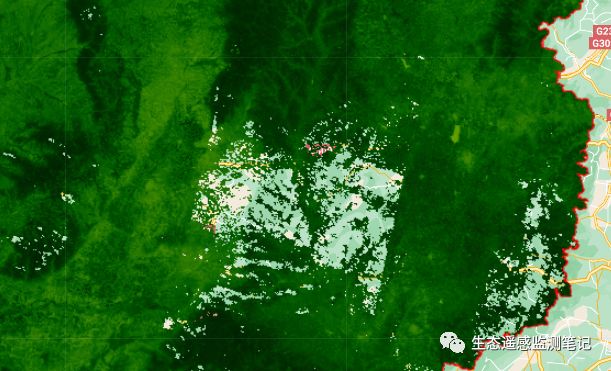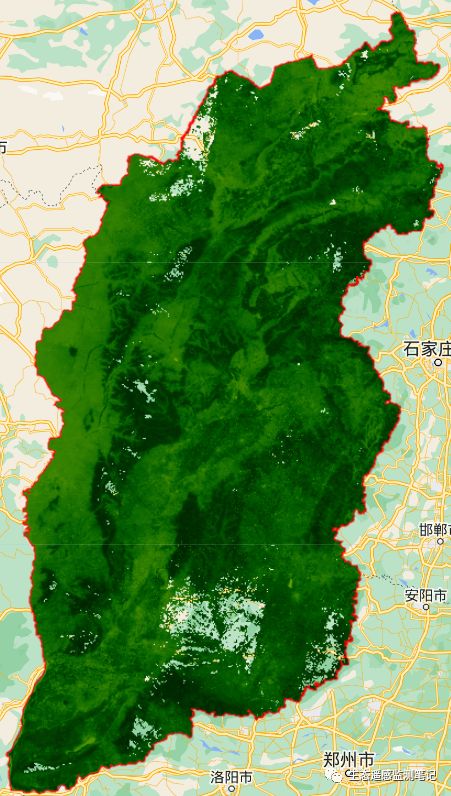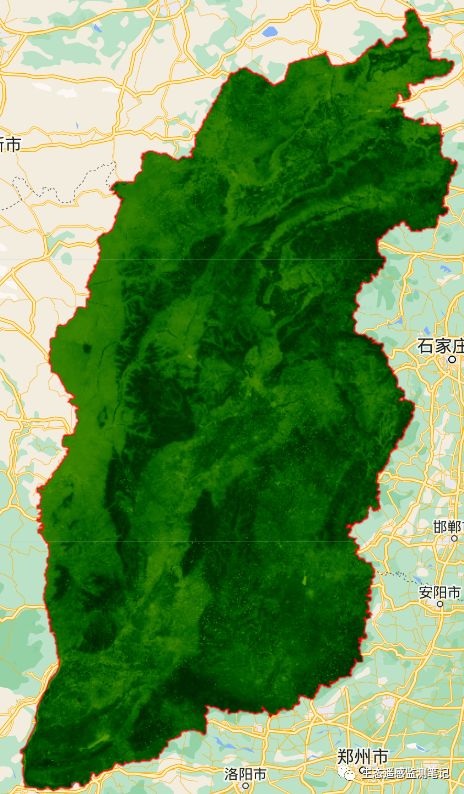Google Earth Engine(GEE)填补缺失影像
今日分享:
Google Earth Engine(GEE)填补缺失影像
之前在做月合成NDVI的过程中,发现如果研究区较大时,一个月的影像覆盖不了整个研究区,就会有缺失的地方,还有就是去云之后,有云量的地区变成空值。例如:
所以今天来用一种插值的方法,来填补缺失的影像,以NDVI为例。
主要实现原理其实就是用前后两个月的NDVI的均值进行填补
01
—
GEE部分实现代码
选择研究区
var roi = ee.FeatureCollection("users/lilei655123/shanxi");
Map.centerObject(roi,7)
var styling = {color:"red",fillColor:"00000000"};
Map.addLayer(roi.style(styling),{},"geometry")
var img_normalize = function(img){
var minMax = img.reduceRegion({
reducer:ee.Reducer.minMax(),
geometry: roi,
scale: 30,
maxPixels: 10e13,
tileScale: 16 })
var year = img.get('year')
var normalize = ee.ImageCollection.fromImages(
img.bandNames().map(function(name){
name = ee.String(name);
var band = img.select(name);
return band.unitScale(ee.Number(minMax.get(name.cat('_min'))), ee.Number(minMax.get(name.cat('_max')))); })
).toBands().rename(img.bandNames());
return normalize;
}landat5的去云函数,加载数据集LANDSAT/LT05/C02/T1_L2
function maskL457sr(image) {//l57去云
// Bit 0 - Fill
// Bit 1 - Dilated Cloud
// Bit 2 - Unused
// Bit 3 - Cloud
// Bit 4 - Cloud Shadow
var qaMask = image.select('QA_PIXEL').bitwiseAnd(parseInt('11111', 2)).eq(0);
var saturationMask = image.select('QA_RADSAT').eq(0);
// Apply the scaling factors to the appropriate bands.
var opticalBands = image.select('SR_B.').multiply(0.0000275).add(-0.2);
var thermalBand = image.select('ST_B6').multiply(0.00341802).add(149.0);
// Replace the original bands with the scaled ones and apply the masks.
return image.addBands(opticalBands, null, true)
.addBands(thermalBand, null, true)
.updateMask(qaMask)
.updateMask(saturationMask);
}
var imageCollection = ee.ImageCollection('LANDSAT/LT05/C02/T1_L2').filterBounds(roi);筛选影像,合成原始影像的月NDVI
var composites = ee.ImageCollection.fromImages(monthCount.map(function(m) {
var startMonth = 1; // 从1月开始
var startYear = ee.Number(2000);
var month = ee.Date.fromYMD(startYear, startMonth, 1).advance(m,'month').get('month');
var year = ee.Date.fromYMD(startYear, startMonth, 1).advance(m,'month').get('year')
// 按年筛选,然后按月筛选
var filtered = imageCollection.filter(ee.Filter.calendarRange({
start: year.subtract(1), //
end: year,
field: 'year'
})).filter(ee.Filter.calendarRange({
start: month,
field: 'month'
}));
// mask for clouds and then take the median///
var composite = filtered.map(maskL457sr).median().clip(roi);
return composite.normalizedDifference(['SR_B4', 'SR_B3']).rename('NDVI')
.set('month', ee.Date.fromYMD(startYear, startMonth, 1).advance(m,'month'))
.set('system:time_start', ee.Date.fromYMD(startYear, startMonth, 1).advance(m,'month').millis());
}));
print(composites)然后用前后两个月的平均值替换被遮挡的像素
var replacedVals = composites.map(function(image){
var currentDate = ee.Date(image.get('system:time_start'));
var meanImage = composites.filterDate(
currentDate.advance(-2,'month'), currentDate.advance(2, 'month')).mean();//33333333333333333333333max min median
// 替换所有被屏蔽的值
return meanImage.where(image, image);
});显示插值后的结果,并导出结果
var Vis = {
min: -1,
max: 1.0,
palette: [
'FFFFFF', 'CE7E45', 'DF923D', 'F1B555', 'FCD163', '99B718', '74A901',
'66A000', '529400', '3E8601', '207401', '056201', '004C00', '023B01',
'012E01', '011D01', '011301'
],
};
Map.addLayer(compos.select(6), Vis, '插值前');
Map.addLayer(stacked.select(6), Vis, 'NDVI');
Export.image.toDrive({
image: stacked.select(0),//选择导出影像的波段0-11 分别代表1-12个月
description: 'NDVI',//选择导出云盘的文件夹名称
crs: "EPSG:4326",//坐标系
scale: 30,//空间分辨率
region: roi,//研究区
maxPixels: 1e13,//最大像元个数
folder: 'NDVI'
});02
—
结果显示
填补前
填补后
可以看出,填补的效果还是非常明显的。
完整代码请在公众号后台私信“0914填补缺失影像”
感谢关注,欢迎转发!
声明:仅供学习使用!
希望关注的朋友们转发,如果对你有帮助的话记得给小编点个赞或者在看!


